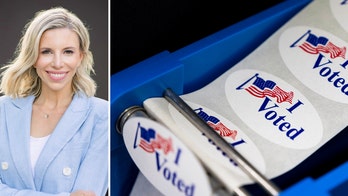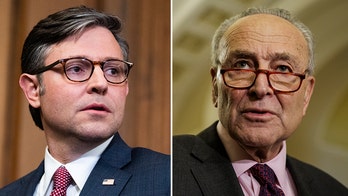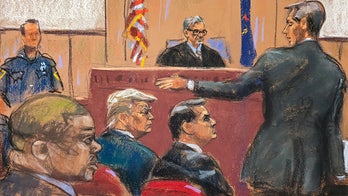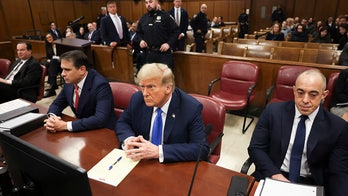Boxers always have a trusty corner man. If the boxer is fazed by too many blows, he’s the one who waves smelling salts under the nostrils of his woozy fighter to revive him for the next round. The smelling salts help the boxer snap out of his stupor.
Congress has its own version of smelling salts. It's the scent of jet fuel.
You can almost detect the aroma of jet fuel wafting over the Capitol in the hours preceding a big Congressional recess. The smell resuscitates lawmakers from their torpor as they anticipate flying home to campaign, spend cherished time with family or going overseas on an official trip.
Such was the case late Friday as the House hustled to wrap up its major bills and abandon Washington for the week-long Memorial Day recess. Congress hasn’t been in a prolonged recess since mid-April when it broke for Easter and Passover. This six-week stretch is usually the longest drive of consecutive weeks Congress is in session each year.
The House exhausted much of that time by passing 49 non-controversial bills, called “suspensions.” The legislation is so non-controversial, that the House “suspends the rules” and allows the measures to come directly to the floor. Lawmakers voted to celebrate “the life of Sam Houston on the 217th anniversary of his birth,” support the “goals and ideas of National Library Week” and congratulate Duke for winning the Final Four.
The House didn’t tackle many substantive items until the final hours of this run. And lawmakers weren’t willing to carve deals until people started to whisper about a dreaded “Saturday session.”
All lawmakers had to do was get a soupcon of that jet fuel bouquet and they were ready to crank through the major docket items.
On Thursday, the House debated a Pentagon bill late into the night. One of the key provisions of this legislation was a repeal of the “Don’t Ask, Don’t Tell” policy that bans gays and lesbians from serving openly in the military.
By Friday, the House completed that measure and also approved a stalled science package funding research and development programs. In addition, lawmakers tackled a $113 billion bill that renews tax cuts, widens unemployment benefits and extends Medicare payments to doctors for 19 months.
But Democratic leaders had to twice pare back the tax legislation. Just a few days ago, the original price tag was $192 billion. But Democratic leaders realized they just didn’t have the votes to approve the measure. So they scaled it back again to $144 billion.
Still, that wasn’t enough to satisfy many fiscally-conscious, so-called “Blue Dog” Democrats who watch the bottom line.
“Many Blue Dogs share our concerns are not prepared to support the package as is,” said Rep. Stephanie Herseth Sandlin (D-SD), one of the top Blue Dogs. “I think some in leadership are realizing we have more things to do.”
And she was right. Which is why Democratic leaders dialed the price tag down a third time to $113 billion.
Herseth Sandlin hinted that leadership used the sprint to the recess as a tactic to force lawmakers to vote for something they weren’t comfortable with. The South Dakota Democrat lamented that leaders should have addressed the Blue Dogs’ concerns weeks ago, “rather than scrambling” and expecting the rank-and-file to “swallow hard and accept more deficit spending.”
In the end, the bill added $54 billion to the deficit.
So Friday morning, Congressional aides rifled through airline schedules and made sure the boss’s bags were packed before sending them to the Capitol to vote on the defense bill, the tax legislation and the science research bill. But what could have been an early-afternoon run for the airport ballooned into a late-afternoon departure as the leadership divvied up the science bill into multiple parts in an effort to pass the measure. That triggered a tranche of 13 votes that started just after 1 pm and didn’t end until nearly 4:20, keeping House members off their planes and tied to the House floor.
But few reporters cared about what unfolded on the floor. All of a sudden, their attention turned to sole pursuit of one man: Rep Joe Sestak (D-PA).
A conflagration erupted Friday morning when the White House announced that Chief of Staff Rahm Emanuel deployed former President Clinton as an emissary to Sestak. It was an effort to persuade the Congressman to drop his challenge to Sen. Arlen Specter (D-PA) in the Democratic primary.
Sestak defeated the five-term senator last week in the primary and now faces former Republican Congressman Pat Toomey in November’s general election.
The White House wanted to determine if Sestak would forgo his bid if awarded an unpaid position on a presidential advisory board. Rumors have swirled for months that the White House offered Sestak a “job.” And Republicans were quick to suggest that a potential offer may have been a quid pro quo, which is illegal.
Sestak’s campaign office issued a statement around lunchtime that amplified what the White House said. But when the bells rang just after 1 pm signaling the lengthy vote series, nearly every reporter in the joint was focused on finding Sestak.
Some reporters pursued Sestak as he left his office in the Longworth House Office Building to go vote. Sestak then made his way across the Capitol plaza, chatting with Rep. Mary Fallin (R-OK). He wore a sky-blue shirt and red tie with a print. He flung his jacket over his shoulder. I approached Sestak near the Capitol steps and asked if he would explain why he didn’t indicate months ago that the conversation was with President Clinton.
“Why don’t I come right out after the vote sometime, OK?” he responded.
But “right out” and “after the vote” would be nearly three hours later.
The vote series became distended as lawmakers had to hang on the floor to complete all three bills. Reporters trolled the corridors, hoping the Pennsylvania Democrat might pop out to chat. I manned the back door of the Speaker’s Lobby near the restroom. I figured nature would eventually call and Sestak might visit the facilities.
He never surfaced.
The buzz during the votes was all about Sestak.
House Speaker Nancy Pelosi (D-CA) held a press conference about the tax and jobs bill. She fielded two questions about Sestak. Rep. Darrell Issa (R-CA) met with reporters in the Speaker’s Lobby.
“This is punishable by prison. This is a felony,” Issa said.
Earlier in the day, Issa wore a dark suit with a dark tie. With no sign of Sestak, reporters badgered Issa. Perhaps realizing Friday was evolving into a news day rather than a sleepy getaway day, Issa then scheduled a news conference. A bit later, Issa’s staff surfaced in the Speaker’s Lobby with a pressed shirt and more telegenic gold and blue striped tie for the boss’s TV appearances.
Rep. Lamar Smith (R-TX), the top Republican on the House Judiciary Committee, then wrote to FBI Director Robert Mueller asking him to investigate the Sestak matter and report back by June 11.
After a few hours, word surfaced that Sestak would speak to reporters at the bottom of the House steps following the votes. Reporters groaned. Not hearing from Sestak until the clock kissed 5 pm did them no favors making deadline. Especially on the Friday afternoon before Memorial Day weekend.
They had planes to catch themselves.
So reporters waited, sipped coffee and nursed Diet Coke. They snacked on Snickers bars and unearthed stale donuts left over from the morning in the press gallery.
The TV folks were also perturbed about the location of Sestak’s press conference. Why not do it in the House Radio-TV Gallery where lawmakers hold most press conference? What about at the Will Rogers Statue, a TV-friendly location near the House floor? Someone pointed out that the base of the House steps can only be used for press conferences by senior House leaders. And then someone else indicated that the overcast day looked like rain.
Finally, just after 4 pm, the House bells rang alerting lawmakers to final vote. The odor of jet fuel was palpable now. Lawmakers voted and then dashed down the House stairs to their awaiting cars, parked on the House plaza. Reps. Jason Chaffetz (R-UT) and Dave Camp (R-MI) were in full sprints as they tore out of the House chamber. Rep. Gus Bilirakis (R-FL) hotfooted it to make Friday night’s game between the Tampa Bay Rays and Chicago White Sox.
Then the reason for Sestak’s odd location to speak to reporters became clear.
Around 4:20, after most lawmakers voted and bolted, Joe Sestak strolled calmly down the steps before a bank of awaiting TV cameras. All took the shot live. Again, the Congressman removed his coat and flung it over his right shoulder. A throng of reporters bird-dogged the Congressman down the Capitol steps.
For that moment, Joe Sestak was the most-pursued man in America. His walk down the steps was Hollywood-esque, televised live on TV.
“I’m sorry I kept you until this,” Sestak began, reporters rubbering around him. The Pennsylvania Democrat then patiently and thoroughly answered each question. Some passersby wedged their way into the covey. Some wore Penn State t-shirts. Another wore a Jeremy Shockey New York Giants jersey. Even Reps. Luis Gutierrez (D-IL) and John Culberson (R-TX) stuck their heads into the gaggle, eager to hear what their colleague would say. Darrell Issa hung near as well, straining to listen.
At 4:45, Sestak answered the final question. Two aides accompanied him back to the Longworth building. At 4:46, the press again glommed onto Issa as he held court with reporters yet again, right where Sestak had been. Some networks took Issa’s remarks live as well.
“Clearly lots of people in the Democratic establishment wanted Sestak out,” Issa said, reiterating he thought the offer was illegal.
The Capitol Hill air was now clear of jet fuel fumes. Most lawmakers clamored to escape town on that final vote and were either at the gate or already on board. But not Sestak and Issa.
The smell of jet fuel is a powerful force in Washington. But it’s trumped by only one thing: the allure of a television camera.




